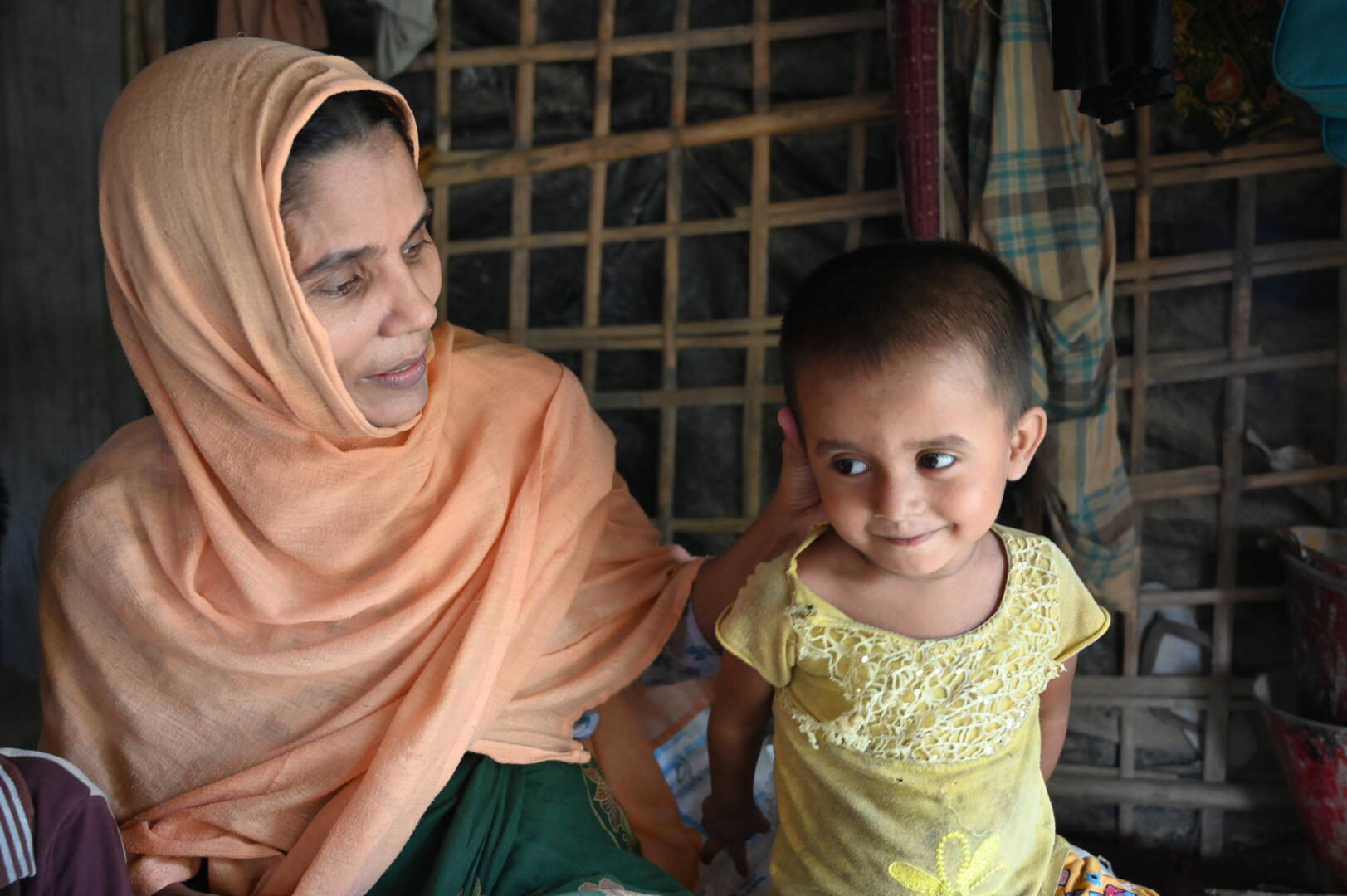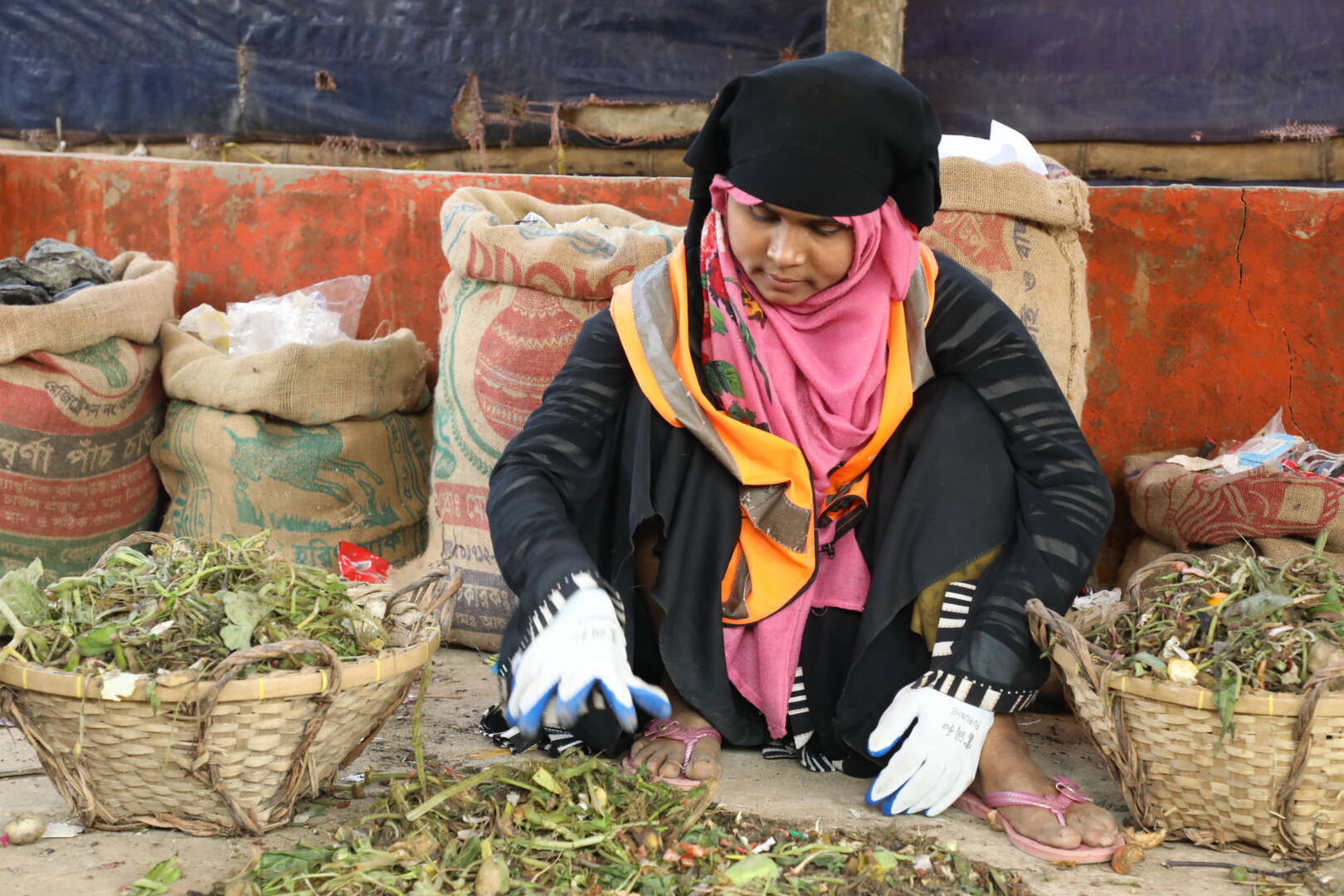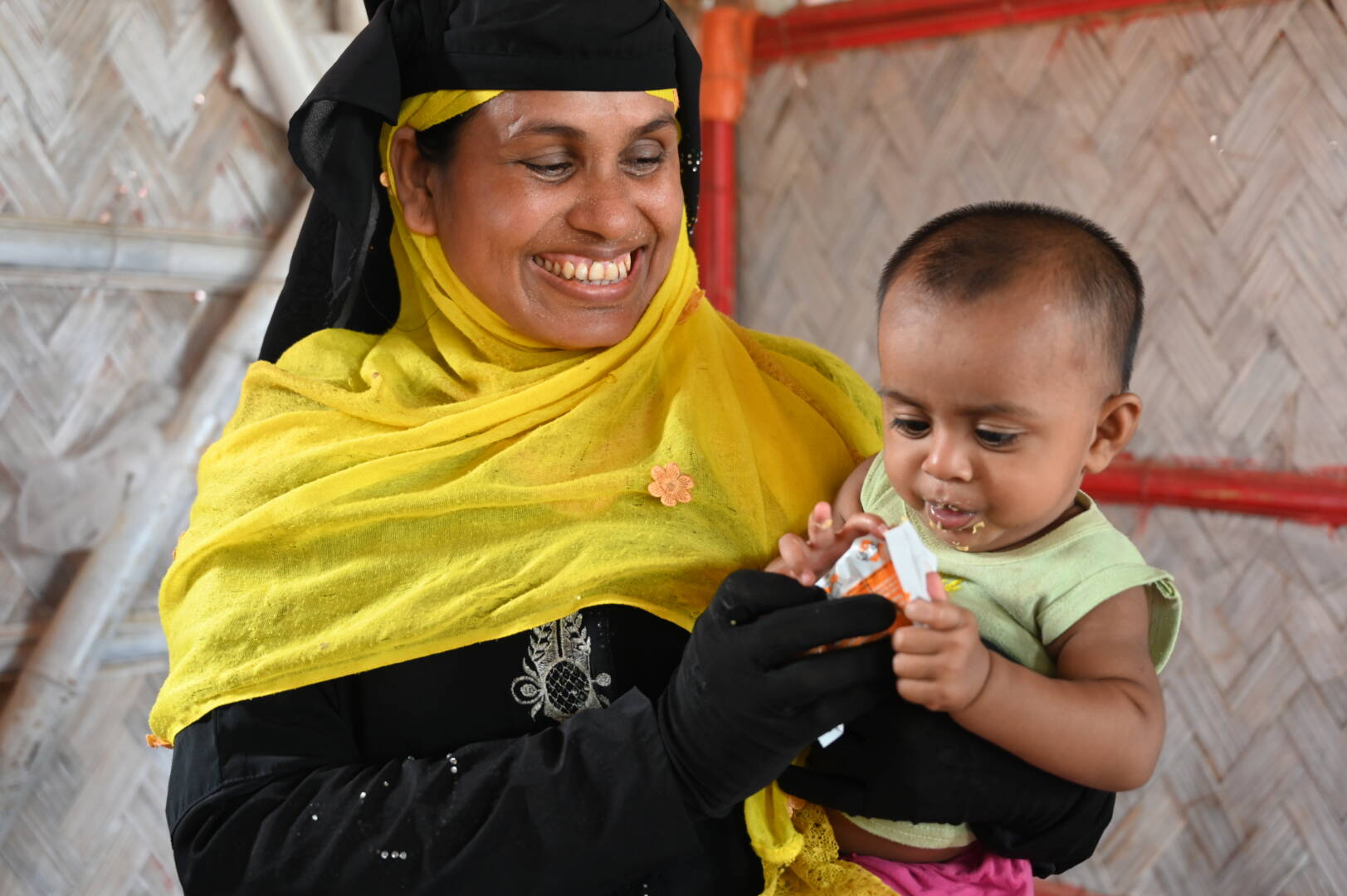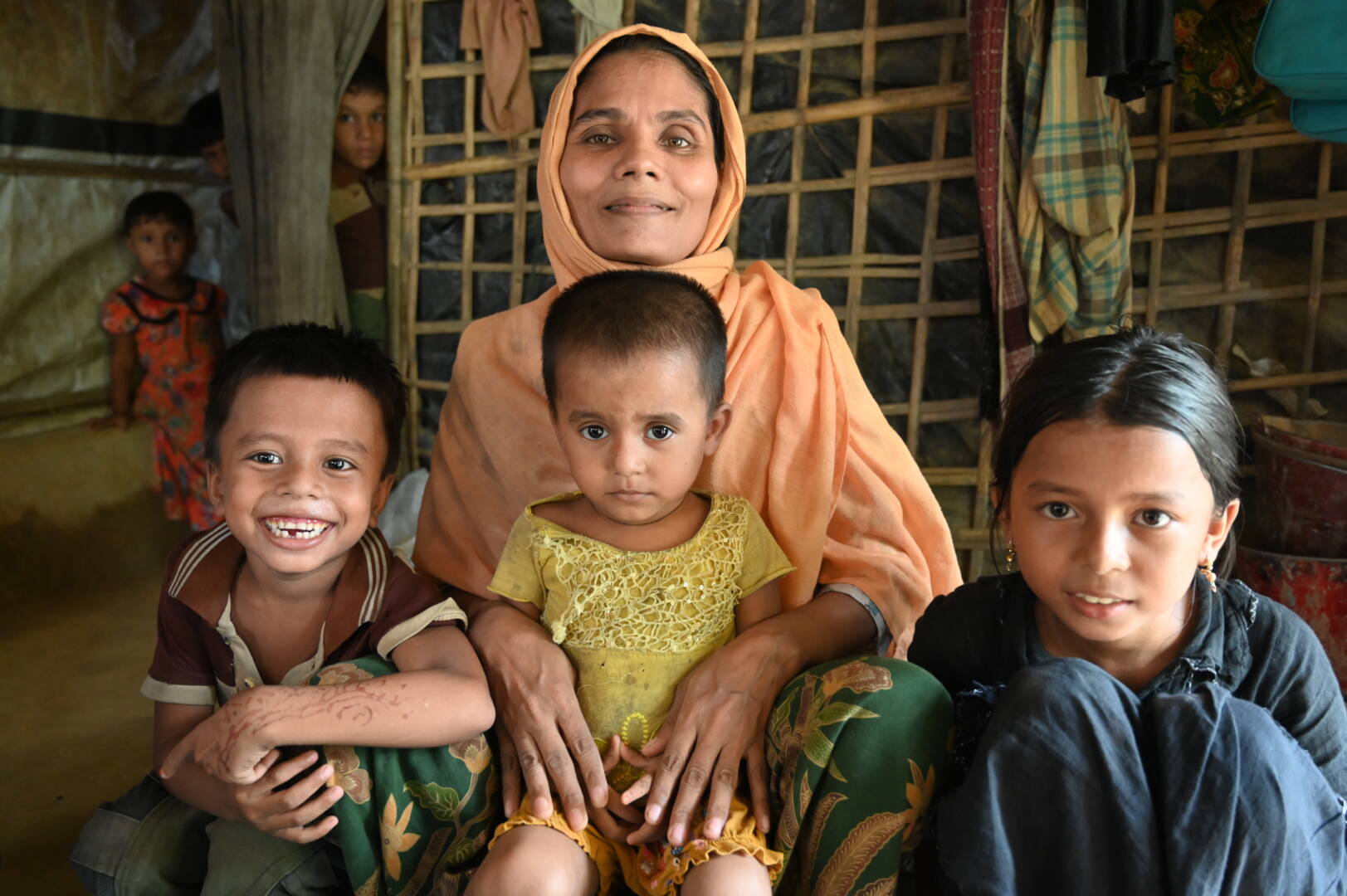About 918,000 people from Myanmar’s Rohingya ethnic minority are now living in refugee camps, including the world’s largest and most densely populated, Kutupalong, in Cox’s Bazar, a city in southeast Bangladesh.
For years, but especially since 2017, the Rohingya people have fled violence, persecution, and crimes against humanity in northern Rakhine State in Myanmar. More than half of those affected by the Rohingya refugee crisis are children.
In the stories below, Rohingya refugees living in Cox’s Bazar share moments of their lives beyond the tragedies they’ve endured. As they continue to look for hope during this prolonged crisis, join us in praying through their stories

“Refugees like us”
Nur, a Rohingya mother of four children, waits patiently alongside fellow refugees to collect her monthly rations of rice, lentils, and oil at a World Vision distribution point, where 500 to 700 refugees are served daily.
For 43-year-old Nur, the camp in Cox’s Bazar is home for the foreseeable future. Nur, her husband Zokoria, and their children fled their home in Myanmar in 2017. They’re not legally permitted to work in the camps, and with little space to grow food, Nur and her family remain dependent on food aid.
“We arrived in Bangladesh after a 12-day walk from our home in Myanmar,” says Nur, whose youngest child, Fatema, was 40 days old at the time. “We had nothing with us to eat. … To survive we ate waste food that people threw outside their homes.”
During the following days, Nur’s family struggled to eat, competing for food with hundreds of thousands of people. “On the main road, we saw a lot of refugees were standing beside a truck crying for food and water,” says Nur.
The family of six found shelter in the home of a fellow Rohingya refugee who had settled in Bangladesh years before. They stayed there for two months. “My husband went out every day to collect food from the kind and generous [local] people,” she recalls.
They now live in a shelter of their own alongside thousands of other families. “The land around the shelter where we live now was full of trees and bushes. My husband and I cleared trees and leveled the ground,” Nur says.
Conditions have improved dramatically since those early days following the refugee influx in 2017. Since 2019, World Vision has worked in partnership with the World Food Programme (WFP) to distribute a total of 12,506 metric tons of food in monthly rations to more than 54,200 Rohingya refugee households.
World Vision plays a key role in managing the food assistance process. Staff members go door-to-door in the camps to share information with the refugees prior to the monthly food distributions. World Vision staff ensures that extremely vulnerable families are identified for special assistance.
The World Food Programme is transferring all refugees to the e-voucher system, whereby they can buy a wide variety of staples and fresh food items at WFP shops using pre-paid debit cards. Nur and her family hope to soon be registered for e-vouchers, which will give them more choice over what they eat and a more diversified diet.
“I am thankful for the essential food that we receive each month,” says Nur. “It has saved our lives and the lives of thousands of other refugees like us.”
Good Shepherd, we pray for continued support for Nur and her family as they struggle with food insecurity and living in uncertainty. Provide the food they need to survive, grow, and thrive. Create the conditions needed for this family to flourish.
Most gracious Father, it is difficult to see children and families suffer, especially from hunger. We pray for You to give the hungry daily bread today (Matthew 6:11) and to put an end to persistent hunger and its causes everywhere. We pray for the provision of other basic needs such as access to clean water, medical care, and any other needs that are not being met in the refugee camps.

For Jamila, a restored sense of dignity
Jamila and her family escaped extreme violence in Myanmar in 2017 at the height of the Rohingya refugee crisis. But their hardships and hunger persisted.
“We had difficulties to manage the family after fleeing to Bangladesh,” says Jamila, a 40-year-old mother of four daughters. Jamila has a disability that affects her ability to stand or walk, and her condition became worse in Bangladesh. She couldn’t walk without the support of others. Her husband also became ill and couldn’t work to earn an income for the family. “That situation was really tough for us to survive.”
Jamila struggled daily to get around the camp in Cox’s Bazar, where refugees continue to build shelters on top of shelters on steep slopes prone to landslides.
Jamila found little relief for people with disabilities.
In 2020, World Vision introduced programming for people with disabilities in Jamila’s camp to ensure that disabled individuals would be able to access services. That restored Jamila’s confidence that she could lead a life of dignity. She has also found a job through a World Vision–supported recycling program, where she sorts plastics from perishable items. Because of her job, she’s now able to experience a greater sense of freedom. World Vision even designed and created an accessible workstation for Jamila.
“I am grateful to World Vision for helping me and my children as well.”
We praise Your name, Lord of all, for creating Jamila. Lord Jesus, our hearts ache for Jamila and her family, who were forced to flee their home in Myanmar due to horrific violence. And our hearts ache for all refugees with disabilities, who face even greater barriers to accessing proper care, humanitarian aid, and basic services they need to survive. Please equip Jamila, the World Vision staff, and others in the camp community as they support each other. We pray World Vision programs will be fruitful and a blessing to all those who participate.
Lord Jesus, give us more of Your compassion for the plight of Rohingya refugees, particularly those living with disabilities. Most gracious Father, we pray for an end to conflict, poverty, and human rights abuses that drive people to flee their communities.

“An endless blessing for us and our children”
Six-month-old Ankis sits on her mother’s lap, her plump fingers in her mouth after having finished a packet of ready-to-use therapeutic food. Her 30-year-old mother, Sowkat, delights in her daughter’s energy — a far cry from the malnourished baby she cradled a month earlier.
“In just one month, I already see an improvement. She looks healthier. I am happy to see my daughter looking happy,” says Sowkat.
Ankis was among 16,300 Rohingya children under 5 who received life-saving supplementary food aid through World Vision’s malnutrition prevention and treatment program in Cox’s Bazar. Ankis had acute moderate malnutrition and her condition was deteriorating.
Sowkat was ill and pregnant with Ankis, her fifth child, when she enrolled in World Vision’s yearlong program in 2020. She was among 4,000 pregnant and lactating women who were supported through the program. “During my pregnancy, I attended counseling sessions here. Staff members advised me to eat nutritious foods, such as colorful vegetables, fish, meat, and fruit. They also demonstrated how to prepare the food,” Sowkat recalls.
Sowkat is hopeful about her health and her daughter’s future. “We were given shelter here in Bangladesh. If agencies like World Vision had not come forward to save our children’s lives, we would have been crying in the wilderness, watching their sufferings,” she says. “The support we have received is an endless blessing for us and our children.”
Great Healer, words can’t express how much it breaks our hearts to see babies and children like Ankis suffer from malnutrition. We are grateful for their healing, and we pray Ankis and Sowkat will face better conditions in days to come. Place Your protective hand on their lives. We pray they will find wellness and places of safety, belonging, and community.
We pray for every child who is precious to You. Lord, we pray for the health and well-being of all Your children and their mothers. We are grateful for the work that is being done by World Vision staff and the healthcare community in Cox’s Bazar. Empower them, sustain them, and give them sufficient resources to carry out their day-to-day work of caring for those You love.
Xavier Sku and Qazi Shamim Hasan of World Vision’s staff in Bangladesh contributed to this report, as did Sevil Omer from World Vision’s U.S. office.
